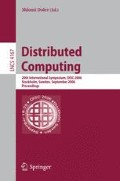Abstract
We present the Time-Bounded Task-PIOA modeling framework, an extension of the Probabilistic I/O Automata (PIOA) framework that is intended to support modeling and verification of security protocols. Time-Bounded Task-PIOAs directly model probabilistic and nondeterministic behavior, partial-information adversarial scheduling, and time-bounded computation. Together, these features are adequate to support modeling of key aspects of security protocols, including secrecy requirements and limitations on the knowledge and computational power of adversarial parties. They also support security protocol verification, using methods that are compatible with informal approaches used in the computational cryptography research community. We illustrate the use of our framework by outlining a proof of functional correctness and security properties for a well-known Oblivious Transfer protocol.
Canetti is supported by NSF CyberTrust Grant #430450; Cheung by DFG/NWO bilateral cooperation project 600.050.011.01 Validation of Stochastic Systems (VOSS); Kaynar and Lynch by DARPA/AFOSR MURI Award #F49620-02-1-0325, MURI AFOSR Award #SA2796PO 1-0000243658, NSF Awards #CCR-0326277 and #CCR-0121277, and USAF, AFRL Award #FA9550-04-1-0121; Pereira by the Belgian National Fund for Scientific Research (FNRS); and Segala by MURST project Constraint-based Verification of reactive systems (CoVer).
Access this chapter
Tax calculation will be finalised at checkout
Purchases are for personal use only
Preview
Unable to display preview. Download preview PDF.
References
Barthe, G., Cederquist, J., Tarento, S.: A machine-checked formalization of the generic model and the random oracle model. In: Basin, D., Rusinowitch, M. (eds.) IJCAR 2004. LNCS, vol. 3097, pp. 385–399. Springer, Heidelberg (2004)
Blanchet, B.: A computationally sound mechanized prover for security protocols. Cryptology ePrint Archive, Report 2005/401 (2005), http://eprint.iacr.org/
Backes, M., Pfitzmann, B., Waidner, M.: Secure asynchronous reactive systems. Cryptology ePrint Archive, Report 2004/082 (2004), http://eprint.iacr.org/
Bellare, M., Rogaway, P.: The game-playing technique and its application to triple encryption. Cryptology ePrint Archive, Report 2004/331 (2004), http://eprint.iacr.org/
Canetti, R.: Universally composable security: A new paradigm for cryptographic protocols. In: Proceedings of the 42nd Annual Conference on Foundations of Computer Science (FOCS) (2001), Full version Available at: http://eprint.iacr.org/2000/067
Canetti, R., Cheung, L., Kaynar, D., Liskov, M., Lynch, N., Pereira, O., Segala, R.: Task-structured probabilistic I/O automata. In: Proceedings of the 8th International Workshop on Discrete Event Systems (WODES), Ann Arbor, Michigan (July 2006)
Canetti, R., Cheung, L., Kaynar, D., Liskov, M., Lynch, N., Pereira, O., Segala, R.: Task-structured probabilistic I/O automata. Technical Report MIT-CSAIL-TR-2006-XXX, CSAIL. MIT, Cambridge, MA (2006)
Canetti, R., Cheung, L., Kaynar, D., Liskov, M., Lynch, N., Pereira, O., Segala, R.: Using task-structured probabilistic I/O automata to analyze an oblivious transfer protocol. Technical Report MIT-CSAIL-TR-2006-047, CSAIL. MIT, Cambridge, MA (June 2006)
Dolev, D., Yao, A.C.: On the security of public-key protocols. IEEE Transactions on Information Theory 2(29), 198–208 (1983)
Even, S., Goldreich, O., Lempel, A.: A randomized protocol for signing contracts. CACM 28(6), 637–647 (1985)
Goldwasser, S., Micali, S., Rackoff, C.: The knowledge complexity of interactive proof systems. SIAM Journal on Computing 18(1), 186–208 (1989)
Goldreich, O., Micali, S., Wigderson, A.: How to play any mental game. In: Proceedings of the 19th Symposium on Theory of Computing (STOC), pp. 218–229 (1987)
Goldreich, O.: Foundations of Cryptography. Basic Tools, vol. I. Cambridge University Press, Cambridge (2001)
Halevi, S.: A plausible approach to computer-aided cryptographic proofs. Cryptology ePrint Archive, Report 2005/181 (2005), http://eprint.iacr.org/
Lincoln, P.D., Mitchell, J.C., Mitchell, M., Scedrov, A.: A probabilistic poly-time framework for protocol analysis. In: Proceedings of the 5th ACM Conference on Computer and Communications Security (CCS-5), pp. 112–121 (1998)
Mateus, P., Mitchell, J.C., Scedrov, A.: Composition of cryptographic protocols in a probabilistic polynomial-time calculus. In: Amadio, R.M., Lugiez, D. (eds.) CONCUR 2003. LNCS, vol. 2761, pp. 327–349. Springer, Heidelberg (2003)
Pfitzmann, B., Waidner, M.: Composition and integrity preservation of secure reactive systems. In: 7th ACM Conference on Computer and Communications Security, pp. 245–254 (2000)
Pfitzmann, B., Waidner, M.: A model for asynchronous reactive systems and its application to secure message transmission. In: IEEE Symposium on Security and Privacy, pp. 184–200 (2001)
Ramanathan, A., Mitchell, J.C., Scedrov, A., Teague, V.: Probabilistic bisimulation and equivalence for security analysis of network protocols. In: Walukiewicz, I. (ed.) FOSSACS 2004. LNCS, vol. 2987, pp. 468–483. Springer, Heidelberg (2004)
Segala, R.: Modeling and Verification of Randomized Distributed Real-Time Systems. Ph.D thesis, Department of Electrical Engineering and Computer Science. MIT (May 1995); Also MIT/LCS/TR-676
Shoup, V.: Sequences of games: a tool for taming complexity in security proofs. Cryptology ePrint Archive, Report 2004/332 (2004), http://eprint.iacr.org/
Segala, R., Lynch, N.: Probabilistic simulations for probabilistic processes. Nordic Journal of Computing 2(2), 250–273 (1995)
Author information
Authors and Affiliations
Editor information
Editors and Affiliations
Rights and permissions
Copyright information
© 2006 Springer-Verlag Berlin Heidelberg
About this paper
Cite this paper
Canetti, R. et al. (2006). Time-Bounded Task-PIOAs: A Framework for Analyzing Security Protocols. In: Dolev, S. (eds) Distributed Computing. DISC 2006. Lecture Notes in Computer Science, vol 4167. Springer, Berlin, Heidelberg. https://doi.org/10.1007/11864219_17
Download citation
DOI: https://doi.org/10.1007/11864219_17
Publisher Name: Springer, Berlin, Heidelberg
Print ISBN: 978-3-540-44624-8
Online ISBN: 978-3-540-44627-9
eBook Packages: Computer ScienceComputer Science (R0)

